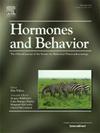Not your mother's hormone therapy: Highly selective estrogen receptor beta agonists as next-generation therapies for menopausal symptom relief
IF 2.5
3区 医学
Q2 BEHAVIORAL SCIENCES
引用次数: 0
Abstract
Although the menopausal transition causes a panoply of unpleasant and disruptive symptoms, many women are reluctant to use estrogen-based treatments due to risks of cancer, cardiovascular disease, and stroke. As we learn more about how estrogens regulate the cellular and circuit mechanisms underlying menopausal symptoms such as hot flashes and brain fog, drug development that specifically targets these mechanisms could provide the therapeutic benefits of estrogens without adverse health effects. This review discusses the rationale for targeting estrogen receptor beta (ERß) with highly selective synthetic agonists to alleviate two common menopausal symptoms: memory dysfunction and hot flashes. We begin by reviewing the history of estrogen-based menopausal hormone therapy, including conjugated equine estrogens and related products. We then describe the neurobiological mechanisms underlying estrogenic regulation of memory and hot flashes, with a particular focus on the role of ERß. Finally, we discuss past and current clinical trials of ERß agonists and highlight pre-clinical data showing that a highly potent and selective synthetic ERß agonist can enhance object recognition and spatial memory, and reduce a drug-induced hot flash, in mouse models of ovarian hormone loss and Alzheimer's disease. Collectively, this work supports the targeted development of highly selective ERß agonists to relieve memory and vasomotor symptoms of menopause.
不是你母亲的激素疗法:高选择性雌激素受体激动剂作为新一代治疗更年期症状的疗法
虽然更年期过渡会引起一系列令人不快和破坏性的症状,但由于癌症、心血管疾病和中风的风险,许多女性不愿意使用雌激素治疗。随着我们更多地了解雌激素如何调节更年期症状(如潮热和脑雾)背后的细胞和电路机制,专门针对这些机制的药物开发可以提供雌激素的治疗益处,而不会对健康产生不良影响。本文综述了高选择性合成激动剂靶向雌激素受体β (ERß)以缓解两种常见的更年期症状:记忆功能障碍和潮热的基本原理。我们首先回顾以雌激素为基础的绝经期激素治疗的历史,包括结合的马雌激素和相关产品。然后,我们描述了记忆和潮热的雌激素调节的神经生物学机制,特别关注ERß的作用。最后,我们讨论了ERß激动剂的过去和目前的临床试验,并强调了临床前数据,表明一种高效和选择性的合成ERß激动剂可以增强卵巢激素丢失和阿尔茨海默病小鼠模型的物体识别和空间记忆,并减少药物引起的热潮。总的来说,这项工作支持高选择性ERß激动剂的靶向开发,以缓解更年期的记忆和血管舒缩症状。
本文章由计算机程序翻译,如有差异,请以英文原文为准。
求助全文
约1分钟内获得全文
求助全文
来源期刊

Hormones and Behavior
医学-行为科学
CiteScore
6.70
自引率
8.60%
发文量
139
审稿时长
91 days
期刊介绍:
Hormones and Behavior publishes original research articles, reviews and special issues concerning hormone-brain-behavior relationships, broadly defined. The journal''s scope ranges from laboratory and field studies concerning neuroendocrine as well as endocrine mechanisms controlling the development or adult expression of behavior to studies concerning the environmental control and evolutionary significance of hormone-behavior relationships. The journal welcomes studies conducted on species ranging from invertebrates to mammals, including humans.
 求助内容:
求助内容: 应助结果提醒方式:
应助结果提醒方式:


